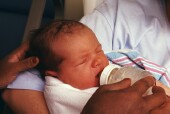- 8 Ways to Increase Dopamine Naturally
- 7 Best Breads for Maintaining Stable Blood Sugar
- Gelatin vs. Collagen: Which is Best for Skin, Nails, and Joints?
- The Long-Term Effects of Daily Turmeric Supplements on Liver Health
- Could Your Grocery Store Meat Be Causing Recurring UTIs?
- Are You Making This Expensive Thermostat Error This Winter?
- Recognizing the Signs of Hypothyroidism
- 10 Strategies to Overcome Insomnia
- Could Artificial Sweeteners Be Aging the Brain Faster?
- Techniques for Soothing Your Nervous System
Bottle-Feeding May Raise Risk of Stomach Obstruction in Infants


MONDAY, Oct. 21Bottle-feeding might increase the risk that infants will develop a common but serious form of stomach obstruction that causes projectile vomiting.
Researchers found that babies were at least twice as likely to suffer hypertrophic pyloric stenosis (HPS) if they were bottle-fed versus breast-fed, according to findings published online Oct. 21 in the journal JAMA Pediatrics.
The risk also increased with the age of the mother, said study co-author Dr. Jarod McAteer, a surgical resident at the University of Washington in Seattle. Children of mothers older than 35 had a five to six times increased risk of pyloric stenosis.
“From a clinician’s standpoint, it’s just one more study that suggests that breast-feeding is important to the health of a newborn,” McAteer said. “Much data beyond this study supports breast-feeding as a much better thing for the infant. Physicians should take it into account and consider whether it’s an important enough factor to influence their counseling of patients.”
HPS occurs due to a thickening of the smooth muscle layer of the pylorus, the passage between the stomach and small intestines. Surgery is required to remove the obstruction.
The condition occurs in about two out of 1,000 babies in the United States, and is one of the more common causes of intestinal obstruction during infancy, the study authors noted in background information. Most infants who develop pyloric stenosis are usually between 3 to 5 weeks old.
Dr. Ben Hoffman, medical director of the Children’s Safety Center at Oregon Health & Science University’s Doernbecher Children’s Hospital, said that “pyloric stenosis is a problem that’s near and dear to the hearts of both pediatricians and pediatric surgeons.”
Hoffman, who was not involved with the study, added, “For a long time, we’ve accepted that we don’t know why it happens. The association between bottle-feeding and pyloric stenosis is certainly intriguing.”
McAteer and his colleagues used Washington state birth certificates and discharge data to examine births between 2003 and 2009. The study included 714 infants admitted to the hospital with HPS. Birth certificates recorded each baby’s feeding status.
Researchers found that the incidence of HPS decreased in Washington from 14 per 10,000 births in 2003 to nine per 10,000 births in 2009. Breast-feeding prevalence increased during that time, from 80 percent in 2003 to 94 percent in 2009.
About 19.5 percent of infants who developed HPS were bottle-fed, compared with 9 percent of babies who were breast-fed, the researchers reported.
The study also delved deeper, looking into how other risk factors might influence the risk of pyloric stenosis, McAteer said.
Neither the sex of the child nor whether the mother smoked appeared to play a role in HPS risk, but doctors did find that the age of the mother might be a factor, McAteer said.
Children of mothers under 20 who were bottle-fed ran a negligible risk versus those who were breast-fed, McAteer said. But children of mothers aged 20 to 35 had a two to three times increased risk if they were bottle-fed, and children of mothers older than 35 had a five to six times increased risk.
This opened up some speculation that hormones could play a part in HPS risk, McAteer said, noting that many baby formulas are soy-based and baby bottles could contain the plastics chemical Bisphenol A (BPA). Both soy and BPA can influence levels of the female hormone estrogen in the human body.
“There may be some kind of an interaction with the mother’s age and estrogen that could have some effect on pyloric muscle tone,” McAteer said. “But it’s still very much an open question.”
While parents should consider this information when choosing how to feed their infant, Hoffman cautioned that the study’s results are based on statistical observations.
“They did a good job showing there is an association, but it is important for people to realize this is far from causality,” Hoffman said. “It gets us a little further along the journey to better understanding. I look forward to the next steps. If we want to answer the question, we really need a large multicenter prospective study to help us get closer to an answer.”
More information
The Nemours Foundation has more on pyloric stenosis.
Source: HealthDay
Copyright © 2026 HealthDay. All rights reserved.










